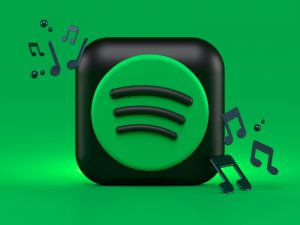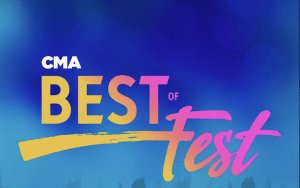How PR Amplifies the Universal Language of Music Amidst a Pandemic
Published on March 19, 2021, at 7:01 p.m.
by Emma Britt.
If any industry has taken a gut-wrenching hit because of the global pandemic, it has been the music industry. Music festivals, concerts and even small karaoke nights no longer look like crowds of people in a venue or thousands of people waiting in line to see their favorite artist. COVID-19 put a pause on the music industry, specifically on new artists waiting patiently for their one chance to jumpstart their careers via small concerts. It also boosted streaming services due to more free time, and inspired innovative tactics to keep fans engaged when not in live events.

With a sudden, drastic need for change within the music industry, public relations skills are needed more than ever. Agencies, streaming and musicians have had to activate their creative juices to keep music alive, fresh and engaging.
The global pandemic has been a hindrance to many in the music industry, but it has also allowed many businesses and music outlets, such as Spotify and Apple Music, to think creatively on how to maintain engagement — and quite frankly, revenue — through the production and streaming of music. Examples of this creativity include drive-in concerts, live online streams with artists, “at home” playlists, and virtual concerts or award shows.
Even though live music revenue has decreased by 25% this year, creative tactics and strategies have increased within the PR music industry realm. Not only did the pandemic affect artists themselves but also a longer chain of employees and businesses, such as vendors, security guards, haulage companies and even local record stores that were forced to close for months.
Spotify Product Manager Katherine Richardson discussed many major hits the music industry took during the global pandemic and how creativity kept the culture alive. Richardson noted that one of the major hits was obviously live events. For Spotify, the cancellation of live events affects much more than just in-person concerts. No ticketing for concerts affected advertising opportunities because advertising is specifically related to ticketing providers. Lack of ticketing is a major challenge for Spotify to maintain its advertising of virtual events the same as it would live events. Spotify is not fully dependent on concert revenue, so it was not impossible to market these virtual events, just different strategies that needed to be implemented in order to maintain promotion.
Richardson described the shift from live events to virtual events as “almost overnight.” She discussed how the domino effect of the cancelation of live concerts affected more than just musicians. It affected restaurants that hosted live music on the weekends, bartenders who would work a shift in the morning and then play a show at night, and even large music cities such as Nashville, Tennessee, which are known for live music.

Another way Spotify adapted to the changes of COVID-19 was an implementation called SoundTrap. This service allows artists to connect with each other across the globe — swapping and sharing musical instruments and services with people they have never met — essentially creating music together. Richardson also discussed a service called Artist Fundraising Pick, a virtual tip jar directly connected to an artist’s Spotify page. This service allows fans to donate directly to their favorite artists that they probably would have seen in concert otherwise, helping artists keep their careers afloat.
Richardson also discussed how Spotify users’ listening habits changed throughout quarantine and the course of the pandemic. “Since everyone has been working from home, we’ve seen a big jump in podcast listening,” expressed Richardson. She also discussed how gaming took a big leap in consumption. A noticeable shift also occurred with streaming during commuting hours; Spotify saw less streaming during commuting because there simply was no commuting.
Overall, Spotify’s adaptation to the pandemic allowed it to grow in ways previously unimaginable. Richardson said that Spotify had the time to intensely focus on how to accurately represent each and every listener.
Kate Kaltenbach, Country Music Association membership engagement manager, discussed how Country Music Association’s word of 2020 was “pivot.” This year allowed CMA to constantly innovate new ways to maintain member engagement while canceling all live events.

“In response to the pandemic, we launched our Music Industry COVID Support (MICS) initiative, which has been focused on helping the music industry get the resources they need to navigate the pandemic,” said Kaltenbach. “Of course, on the events and fan-facing side, our teams were hard at work figuring out how we could continue to engage with fans and expand the reach of country music through content ventures like “CMA Best of Fest” and “CMA Summer Stay-Cay.”
CMA Best of Fest was a three-hour show highlighting 16 years of past performances from CMA’s annual CMA Fest, since the festival could not happen in person. CMA’s Summer Stay-Cay took place this July with various artist performances, Q&A sessions and fun games included in the virtual summer event.
In terms of beneficial changes within public relations for CMA, Kaltenbach explained, “Early on during the pandemic, I was on a webinar where one of the panelists said, ‘As a trade organization, the more pain your industry is in, the more your members need you.’ That really stuck with me and proved to be true. Our members and industry in general have dealt with something that no one ever expected, and as their trade organization we’ve done everything we can to be there for them and make their lives a little bit easier.” CMA has also been providing additional resources, such as health insurance information, mental health resources and food security assistance to its consumers. CMA emphasized health and wellness for its followers before anything else during this time.
Through clear, succinct digital communication, consistent, strong effort and new, innovative strategies to maintain member engagement, organizations such as Spotify and CMA have found a way to keep the music industry afloat in the midst of a global pandemic. Their efforts are a clear representation of how the universal language of music cannot be silenced.




